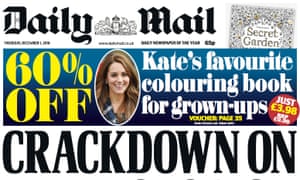
The new chief executive of the Daily Mail & General Trust, the parent of the Daily Mail and Mail Online, has refused to rule out a potential sale of the newspaper, saying there are “no sacred cows” in his strategic review of the business.
Paul Zwillenberg, the Boston Consulting Group senior executive who took over at DMGT in June, said that if the right price was offered he would have to consider a sale.
“There are no sacred cows,” he told a City analyst who asked at DMGT’s full-year results presentation if the titles could be sold off. “We are, have been, and continue to be an active portfolio manager. If someone values our business significantly greater than we value it ourselves, we will listen.”
However, analysts believe that DMGT will never sell the print titles, although the digital future of Mail Online could be less certain.
DMGT can trace its roots to the launch of the Daily Mail in 1896, and Lord Rothermere, the current chairman, whose family is the controlling shareholder, is the great-grandson of one of the newspaper’s co-founders.
“A sale of the Daily Mail is a very low-probability outcome of the strategic review,” said Alex DeGroote, analyst at Peel Hunt. “It is part of the DNA of the group and it is not performing that badly.”
He added that DMGT’s move earlier this year to enter talks with private equity companies interested in bidding for Yahoo pointed to the potential for a strategic deal to boost Mail Online in the US.
“The Yahoo move tells you where their thinking is at,” he said. “It means they could be open to partnering with a US internet property to create __more scale. It is the only way they are going to crack it. They have a foothold, but need to scale up.”
DMGT profits fell by a quarter at its newspaper operation following a double-digit fall in print advertising revenues and investment in Mail Online in the year to the end of September.
The company reported a 23% fall in operating profits, to £77m, at its consumer division, DMG Media, which takes in the Daily Mail, Mail on Sunday, Mail Online and freesheet Metro. The group also took a £25m writedown on US millennials site Elite Daily.
Total revenues for the Mail businesses fell by 2% to £577m in the financial year to September, offsetting a 12% fall in print advertising income. Mail Online increased its revenues 19% year on year, to £93m, up on the 16% growth rate in 2015.
Revenues at Mail Online’s US operation, a huge focus for the media group, grew by 28% to £24m, as the company said it began to gain real traction as a brand among advertising buyers. “We have been increasing our digital investments to build the critical scale required internationally and I expect Mail Online to continue on its path to profitability,” said the DMGT chief executive, Paul Zwillenberg.
Operating profits at the Mail businesses fell by 17% to £69m. Metro saw revenues fall 9% to £65m and profits drop 12% to £15m. About 200 jobs were cut at DMG Media over the year.
The company said that losses at Elite Daily, the “voice of generation Y”, which it acquired in January last year, had “exceeded expectations”. It has completely written down the value of the business, incurring a £25m impairment charge. Revenues at Elite Daily grew 44% to £10m.
DMGT said the performance of its consumer division, together with declines at Euromoney, dragged the businesses’ total adjusted operating profits down 11% to £277m. Its business-to-business portfolio, which includes events, information and the RMS division, helped keep total revenues stable at £1.9bn. Total revenues, profits and earnings per share beat analysts’ expectations, leading to a 7% jump in DMGT’s share price in early trading.
“Overall, we expect the earnings per share and solid guidance to drive a positive share price reaction, in the context of cheap valuation and perceived kitchen-sinking risk with the new chief executive,” said William Packer, the executive director of media equity research at Exane BNP Paribas.
On Thursday morning, Zwillenberg outlined the details of a new strategy to analysts and investors that “focuses on improving operational execution, increasing the portfolio’s focus and enhancing financial flexibility”. Zwillenberg has been conducting a review of the DMGT business since his arrival in June. The company indicatedthat it may sell off or exit some areas of its business.
“When we look at our businesses, we recognise that fundamentally some have __more potential than others,” he said. “There are some businesses where we are the best owner and others that we may not be. We are not a forced seller of any assets. We will sell when the time is right, when [specific] businesses are worth more to other people than to us.”
Some analysts have argued that DMGT should be split into media and business-to-business operations.
In September, DMGT said it had cut more than 400 jobs in the past year, with “just less than half” coming from DMG Media, which employs 2,700 staff, while the company employs 10,000 globally. It has taken £55m in exceptional charges, £37m of which relates to organisational and headcount reduction costs.
In May, DMGT issued a profit warning driven by a double-digit decline in its print advertising business in the first half.